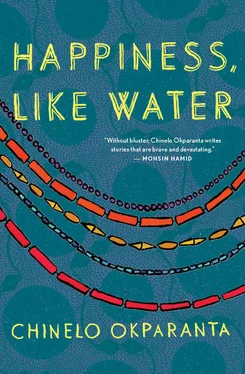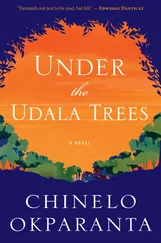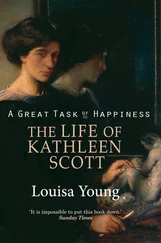‘You couldn’t possibly know what it’s like to see someone from the eyes of God.’ As I say it, I look up at her, and I examine her, as if examining will give me some clue as to what she is trying to tell me. And it occurs to me that perhaps she is right. Because when I look at her, I see something all-beautiful in her, something all-perfect, if there ever was such a thing.
She leaves where she is sitting on the bench, moves to crouch down in front of me, facing me. She is still holding her little box. She stoops on one knee and looks me in the eye and tells me how it’s all wrong. She tells me that, beyond the fact that the Bible condemns that sort of love, she is almost certain that she’ll not be good enough, that she couldn’t possibly have experienced enough of the world to make it work, to rise to the level of the person she’s fallen for. But that she’s in love, and she’s been trying to fight it, but she can’t fight it any more.
‘You’re getting married,’ I remind her. And I imagine the wedding, her mama tinkering with the wedding attire, fussing with the wrappers, placing the jigida beads just so. I imagine that I hear her mama’s voice in the wedding hall, sharp and imperious, ordering Arinze around, telling him how to place the chairs, that sort of thing. I imagine Nwafor’s face, rough with stubble around the chin and cheeks. A man.
I imagine Grace running her fingers across his face, across his stubble, and I try to imagine her enjoying the sensation. I see his arms coming around her waist, I see her forcing her eyes shut, and when the announcement to kiss the bride is made, I imagine a stiff embrace, an awkward and lifeless peck.
I replace Nwafor with myself. I imagine myself kissing her, and I imagine her leaning into me, running her fingers across the wrinkles on my face, through my greying locks of hair. And I feel myself aching. And I feel something like tears moistening my skin.
‘You’re getting married,’ I say again, in a whisper.
‘I know,’ she says.
We don’t say anything for a while, then she speaks, and the words gush out as if she’s in a hurry to spill them. ‘You’re much older, and I’m much younger,’ she says. Her voice is low, and there is a bit of a quiver in it. ‘One day, you’ll begin to stoop, you might have to rely on a cane, and you’ll lose your sight, your hearing, and maybe you’ll even begin to lose your mind. And I will love you still. I’ll love you the whole way through,’ she says. ‘I know that I will.’
I turn to look at her, because I believe her. And suddenly I’m extending my hand to slap her across her face, because I understand what she’s telling me, and I understand that she’s giving me permission to feel a way that I’m not sure I want the permission to feel. But her hand catches mine, as if she has read my mind. And she buries herself into me, wraps her arms around me.
‘But then,’ she whispers, ‘who’s to say that I won’t die first? Who’s to say that you won’t be the one burying me?’
‘Hush,’ I tell her, quietly, shaking my head, and I begin to sob.
As I kiss her, I don’t think of the practical things, like what this will mean for my job, the scandal it might cause, the shame it might bring. I don’t think of how I will explain all this to my daughter, to her husband, how they will explain it to their son. I don’t think of all the scandalous affairs that I’ve witnessed in my twenty years at the university. I don’t think of my reaction to them, not that I’ve ever been one to condemn, but I don’t think of my former disbelief at people — colleagues who, at such distinguished positions at the university, allowed fleeting romances between themselves and their students to interfere with their careers. I don’t think of any of this as we kiss.
And I don’t think of the Bible, of its verses about unnatural affections and abominations. Because it doesn’t feel sinful to me. Because, unlike with Pharaoh and his magicians, none of this is meant to be a challenge to God.
Instead I relent in her arms and think of how good it feels — how nice her skin feels on mine. And I continue to taste her lips, plump and sweet. And I breathe in her scent, flowery and light, something like lavender.
She pulls just a bit away then, fusses with the gold ribbons on the red box, tugs the ribbons until they come undone. She reaches inside the box and takes out a small round object in gold wrapping. She holds out the object in the space above my thighs. ‘For you,’ she says to me. ‘A wedding favour,’ she says.
I reach out to accept. She places the object into my cupped hand, and then she covers my hand with her own. Our hands linger in mid-air that way, mine in hers. Then I pull away, because the whole thing feels not quite like a celebration, something like unadorned acceptance, just a bit short of joyful.
And I think that perhaps all this will do. The waterfowls are still quacking, and the sun is high in the sky. The river is still glowing in shades of silver and gold. Grace is sitting next to me, and I can’t help thinking that perhaps the verge of joy is its own form of happiness.
The peeling linoleum on the countertop, near the sink, is the only sign that Celeste was here, that she is gone. It is speckled grey and turned up at one corner like the flap of an old envelope. Celeste’s blood, that tiny drip of it, now dry and jagged around the edges, is the envelope’s seal; but it is a seal that does nothing to tack the envelope closed.
Ifeinwa stands at the sink, rinsing leaves. She rinses them one by one, and then the tomatoes, and then the carrots. All of them, she rinses carefully, as she would in Port Harcourt; and of course, there, where vegetables are sold fresh from the farm with specks of dirt and sand on them — there, such fervent rinsing would be necessary.
But she is here. Still, she rinses them that old way, as if they have not already been washed and dried and packaged for her to use: it is always some time before the salad is made.
I stand by the door that separates the kitchen from the dining room, and I watch. She is humming, and the sound is like an old lady’s song, a folk song, the kind my mama used to sing back home, her legs braced against the sides of the mortar, her arms rising and falling with each strike of the pestle on the yam.
I imagine Ifeinwa back in Nigeria, her wrapper tied around her chest or in a knot above her shoulder. She is in her family’s compound, and she is carrying a large bowl on her lap — rinsing palm kernels for oil. Soon, she switches from the kernels to rinsing beans. And after the beans, she pours a small bag of rice onto a tray. She stays with the rice for some time, first shuffling the grains with her fingers, picking out tiny stones as she goes. Then she flips the rice in the tray. With every flip she fills her mouth with air and blows the air over the rice. The chaff rises from the tray like dust in the air. She flips and flips, and she blows air over the rice until chaff no longer rises from it.
I shake the images away. Here, where fruit and vegetables and grains are sold as ready-to-eat, where they glisten under the grocery-store lights, all that cleaning and rinsing is not necessary. I walk over to Ifeinwa at the sink. ‘Let me help,’ I say. I’m carrying with me two small tubers of yam, purchased on my way back from work, at the African store down the block from Beacon Street.
‘You do the yam,’ I say, handing the tubers to her. ‘I’ll finish the salad.’
She laughs. ‘I’m taking too long?’ she asks. Her voice is soft, and suddenly I’m aware of how smooth her words have become. Already there is that fluidity of American English in her tone, a lilt which took me the better part of a decade to master. Already, she is mastering it.
Читать дальше












